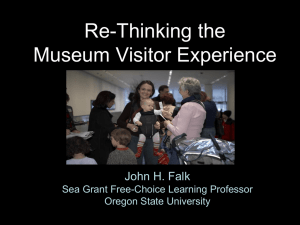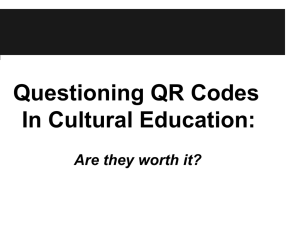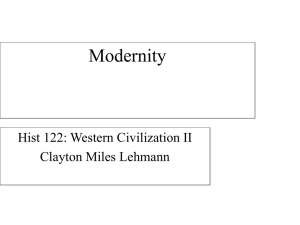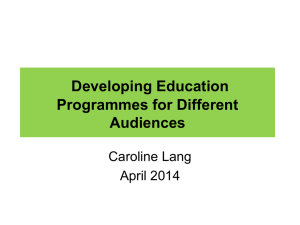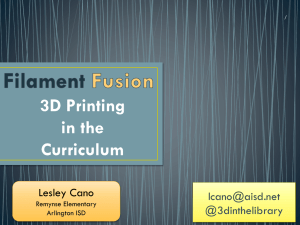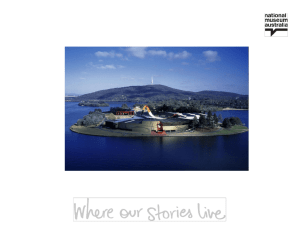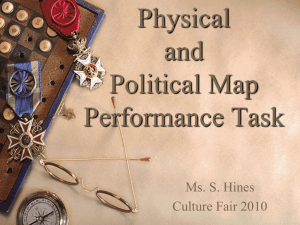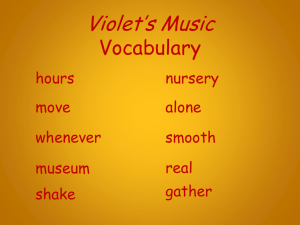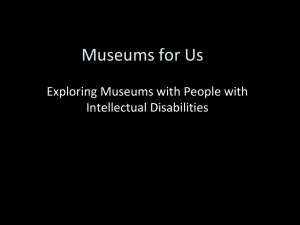Understanding Learning in and from Museums
advertisement
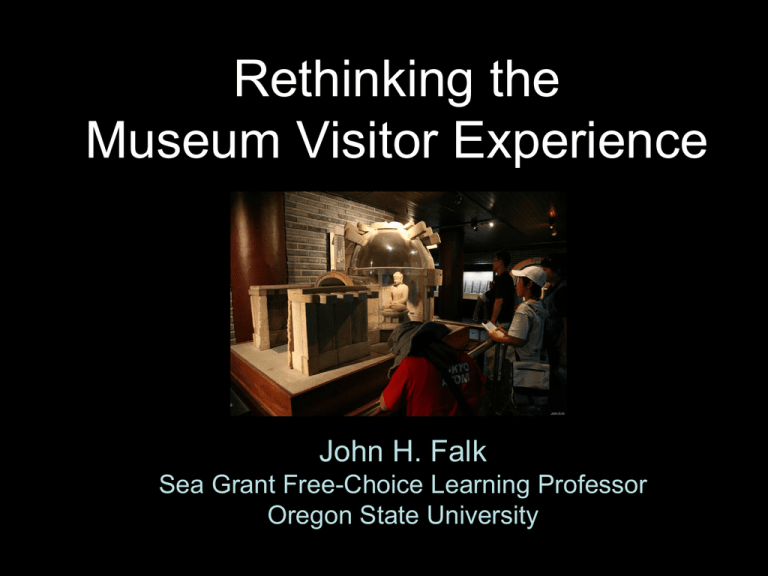
Rethinking the Museum Visitor Experience John H. Falk Sea Grant Free-Choice Learning Professor Oregon State University Key Questions: • Why do people visit museums? • What do visitors do inside the museum and why? • What meanings do visitors take away from their museum visit? • How would this information allow us to improve museum practice? Most efforts to describe and understand museums and their visitors have begun and ended inside the “four walls” of the museum. Most efforts to describe and understand museums and their visitors have focused on PERMANENT qualities of either: MUSEUM – content or style of exhibits VISITOR – age, race/ethnicity visit frequency, social arrangement or address The museum visitor experience extends beyond the museum’s spatial and temporal boundaries. BEFORE VISIT AFTER VISIT The museum visitor experience is not something tangible and immutable but rather an ephemeral, constructed relationship that uniquely occurs each time a person visits a museum. Q: What would make these people, visit this museum, on this day? •A: Each and every visitor comes in •order to fulfill his/her own •personal (identity-related) needs. Defining Identity • Both internal and external – how we perceive ourselves and others perceive us. • We don’t have just one identity but multiple identities; each situated within the realities of physical and socio-cultural world. • We have both “I” identities and “i” identities. • Identity can be made “visible” through descriptions of motivations/needs/actions. Identity-Related Visit Motivations People visit museums in order to satisfy some personal and/or social need or desire. • Identity-related motivations are based upon the ways the public (currently) perceives the attributes and value of a particular museum. What Happens at the Museum As we’ve learned over many years, the museum visit is shaped by the visitor’s Personal, Socio-Cultural and Physical Contexts. However, a visitor’s identity-related visit motivation(s) create a basic trajectory for the visit. WHY someone comes to the museum shapes WHAT he/she finds interesting & important. Long-Term Impact of Experience • Why a person comes to the museum not only shapes what s/he does in the museum but also his/ her long-term memories and the meanings created about the experience. So Why Do People Come to Museums? Explorer I came here primarily because it interested me and I thought I’d like it... Motivated by Personal Curiosity Motivated by Personal Curiosity Facilitator I came here primarily because others would like it or wanted to come. Motivated by Other People Experience Seeker I came here because it was an attraction or thing to do in this community; its reputation. Motivated by Desire to See & Experience Place Professional/Hobbyist I came here primarily because it relates to something I actively pursue as my job or my hobby. Motivated by Specific Knowledge-Related Goals Motivated by Specific Knowledge-Related Goals Recharger I came here primarily because it will help me feel refreshed or focused or appreciative Motivated by Contemplative or Restorative Experience Cultural Affinity Motivated by “I” Identity I came here primarily because it speaks to my heritage, my sense of personhood. Respectful Pilgrim I came here primarily to honor the memory of those represented here. Motivated by Sense of Duty or Obligation What My Research Shows: • The majority of visitors to all kinds of museums can be successfully categorized as visiting for one, or some combination, of these 5 (7) identity-related reasons. Individuals with similar motivations have qualitatively similar visit experiences and longterm patterns of long-term meaning making. Identity-related motivations Implications do not answer all aspects of: for Practice * Why visitors come * What they do in the museum * What they take away However, a wide range of museum functions can benefit by using this perspective -- Education & Exhibit Design Marketing & Visitor Services Education & Exhibit Design: • By knowing visitor’s entering identity-related visit motivations we can better customize the museum visit experience and provide each visitor what s/he really wants. • • • • • • • Exhibits and programs, Including school field trips, should be designed to accommodate the diversity of visitor needs and interests. Marketing & Visitor Studies: Visitors’ identity-related motivations help us understand why visitors ARE CURRENTLY coming to our museums. They also tells us why people DO NOT CURRENTLY visit. Visitors’ identity-related motivations provide a way to more accurately measure whether visitors learned from their experiences.
